To all the players who believe it’s too late to be noticed; those who feel they’ve always been overlooked; those who feel that their big opportunity has receded as quickly as Lawrence Dallaglio’s hairline, you can think again. Erik Lund is proof of that.
In the modern-day game, where if you’re not scouted by a top club by the age of 16, if you’re clearly not the ‘Next Big Thing’, it’s easy to just give up hope. Why bother?
Lund’s rugby journey provides a refreshing tonic to those who feel they have reached the point of ‘What’s the point?’
And with mental health never being so important as it is now amidst lockdowns and Covid-related issues, the 41-year-old espouses the virtues of resilience and a work/life balance – not only to help players deal with the rigours of professional rugby but to also properly prepare them for a career afterwards.
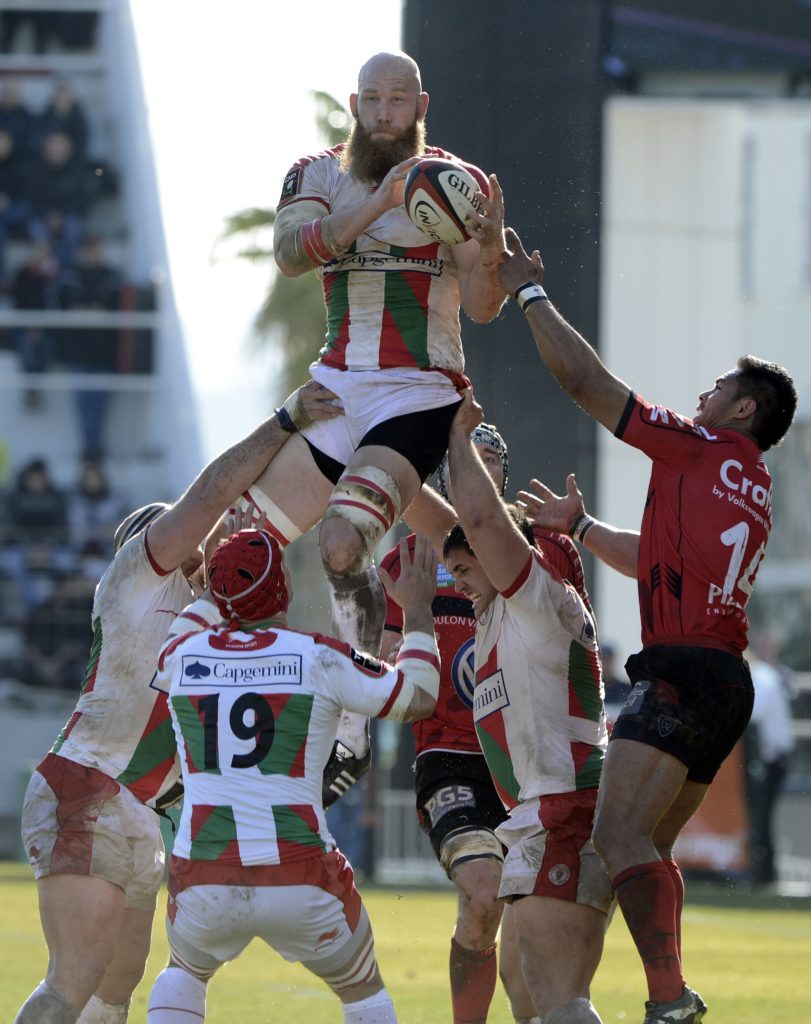
Even two decades ago, the oddities and idiosyncrasies that made the second row such a cult hero at Biarritz were as obvious to see as the shaven head and foot-long beard that he continues to sport.
This writer was fortunate enough to play alongside ‘The Viking’ for the best part of 10 years, seven at Lancaster Royal Grammar School (LRGS) and another three at Newcastle University in a few social, ‘knockabout’ games with our mates in a team called the Jesmond Jaguars. And even then, it wasn’t only his 6ft 8in, 20st frame that made him stand out from the crowd.
In one match, Lund was reprimanded by the referee for carrying the ball under one arm and an opposition player under the other.
Before school matches, Lund would sit down in the LRGS boarding house and religiously watch Mick ‘the Munch’ Skinner’s ‘Out to Munch’ on VHS – yes, it was that long ago… Every tackle he put in during the subsequent game would be accompanied by an audible ‘Bosh!’ or ‘Large!’; every hand-off with a ‘Get off!’.
At university, he took it to a whole new level. In one match, Lund was reprimanded by the referee for carrying the ball under one arm and an opposition player under the other. Then there was the time he used an opponent as a ‘human shield’, grabbing the unsuspecting fellow by the jersey and throwing him about like a rag doll into any would-be tacklers.
On another occasion, he vowed to hand-off every single player in the Medics XV, only to receive another stern telling-off from the disbelieving ref after running backwards so he could deliver facial punishment to a guy who hadn’t yet been ticked off his checklist.
Then, in the beery aftermath, Lund would inevitably get on the guitar and belt out: “All my pizzas right here, right now. Pepperoni and cheese. Yeah, yeah.” to the tune of tune of Oasis’s ‘D’You Know What I Mean’, before phoning the team’s sponsors, Pizza King, for a delivery.
Great and unforgettable days. And while my rugby ‘career’ – an incredibly generous term – understandably petered out due to being a fly-half with zero turn of pace (Jason Leonard could easily beat me in a sprint), lamentable goal-kicking ability and a dummy that could be forecasted three days in advance, I watched with pride as Lund went on to play for Rotherham, Leeds, the galacticos of Biarritz, 89 caps for Norway (thanks to his his Norwegian father, who played basketball for his country) and the Barbarians.
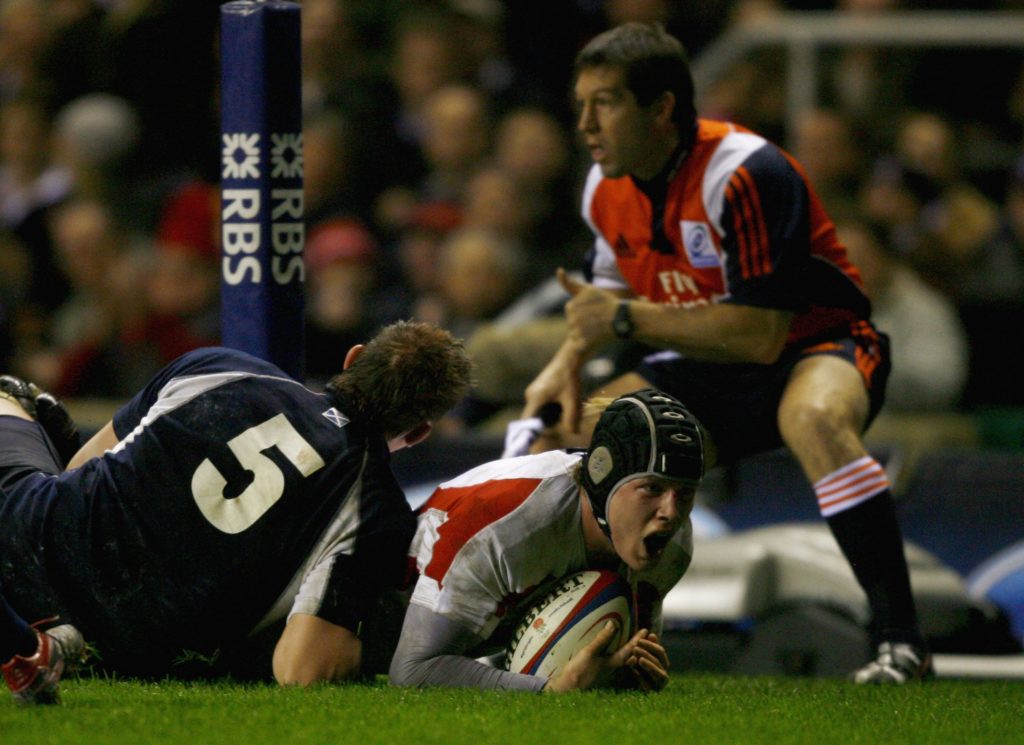
But for the past two decades, I’ve been carrying a heavy burden. A claim to shame, not fame. At a time and an age when talented players were – and are still – being hoovered up by Premiership clubs or being put on international pathways, am I responsible for hiding Lund’s light under a bushel? The reason he wasn’t selected by England, like his younger brother, former Sale and Biarritz flanker Magnus, who won 10 caps? What could he have achieved if I hadn’t encouraged him to put a pepperoni pizza before professional rugby?
Thankfully, though, Lund absolved my guilty conscience.
I’m glad I did it that way as well because it made me appreciate living the professional rugby life.
“Mentally, I wasn’t ready for professional rugby,” said Lund. “It wasn’t a top priority at all for me at that time. It wasn’t even on the agenda.
“Rugby was fun in those days – and I’m glad it was fun. I enjoyed the times we had, university was a great laugh.
“Now that I’ve retired as a player, I’m glad I did it that way as well because it made me appreciate living the professional rugby life. Getting that work and life experience have also helped my transition after my Biarritz contract ended.
“In hindsight, maybe I should have gone for it a bit more. Maybe I could have ended up with some international caps for a team that’s not Norway and potentially a bigger career. But I just wasn’t ready for it.”
Sometimes it isn’t necessary to follow the structured national age-group path – at school, Lund had only managed to represent Lancashire Schools – yet still reached the summit. It may be a bewildering maze of a route, but you can get there in the end.
Here comes a condensed version of Lund’s zigzag path. Are you ready? Good, then we can begin…
Having completed his maths degree at Newcastle University, Lund did a computer science course, signed up to do a Masters at Salford University and got in touch with Manchester Rugby Club. He joined them on a part-time basis, went to National Two’s Fylde on loan (“the first time I consistently played ‘men’s rugby’”) and got selected for the Lancashire county side, who went on to win the County Championship at Twickenham in 2003.
From there, he was picked up by Sedgley Park, where he spent three seasons in National One, before joining an ambitious Rotherham team who were hoping to make the gargantuan leap to the Premiership. They didn’t quite make it – finishing second – but Leeds did, who hoovered up Lund for their 2007 top-flight campaign. Relegation, promotion, then survival followed. But then Biarritz, where his sibling Magnus was already playing, came calling in 2010.
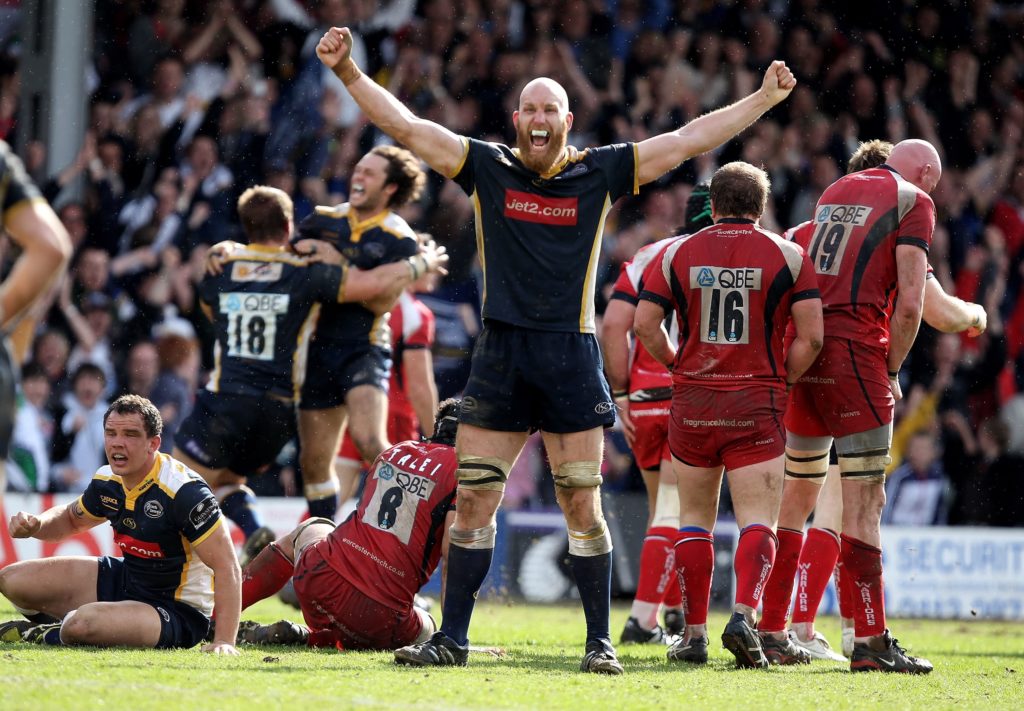
Leeds and then-coach and World Cup winner Neil Back wanted Lund to stay, but who could say no to Biarritz? Playing alongside legends of the game like Imanol Harinordoquy, Damien Traille, Dmitri Yachvili… The Heineken Champions Cup… The Top 14… It’s a long, long way from the Jesmond Jaguars.
“I enjoyed Leeds, playing top-level rugby for the first time was really good. There were no superstars, so it was very much a team environment, which suited me,” said Lund. “It was a test for me to see if I could do it. Lots of people had said, ‘Oh yeah, you can play Premiership rugby’, but you never know unless you do, put yourself under that pressure and give it a go. I played probably 80 per cent of the matches and played the full game, so it was great.”
Playing at Leeds, though, is different gravy to Biarritz. Bisto granules compared to Michelin-starred beef jus.
“Going from a club like Leeds, where there was no one who you’d put in a ‘Premiership team of the week’ to Biarritz, where they had 30 per cent of the French national team, plus a couple of other big dogs in the international rugby world, the pressure was there,” said Lund, who states former France scrum-half Yachvili to be the most skilled player he ever played alongside. It’s a bit disappointing that I wasn’t top of his list, but I’ll just tell myself I was in the top five…
He added: “But it wasn’t a complete shock as I obviously had my brother there already, so I had a lot of insight into the set-up. I didn’t feel out of my depth. I knew I was fit so could cope with the speed of the game.
The difficulty is feeling part of the team when you’re all sat around the dinner table and you haven’t got a clue what they’re on about.
“The problem was transitioning to doing everything in French. The last time I’d learnt French was in my GCSEs. I learnt more in three months than in the five years I did it at school.
“It took me a year to 18 months to be able to talk properly to my team-mates. In terms of strictly ‘rugby talk’, just a couple of months. The actual calls for the lineout and set-plays are so abstract anyway, they might be names of cars, while standard calls like ‘drift’ or ‘pass’, you get that pretty quick.
“The difficulty is feeling part of the team when you’re all sat around the dinner table and you haven’t got a clue what they’re on about. You know it’s great banter because they’re all laughing, but if you don’t get it, you just feel a bit on the outside.
“Once I got past that, I felt at home, I felt really good. The older, more experienced players respected me because I came in and played from day one, 80 minutes a game. That made my life easier.”
Lund quickly established himself as a fans’ favourite at a Biarritz side filled with some of the superstars of world rugby. And whilst they could never quite shed the tag of the nearly-men of Europe as two-time runners-up and three-time semi-finalists, Lund points to the European Challenge Cup triumph in 2012 as one of his two best career highlights. He also relished testing himself against Test players.
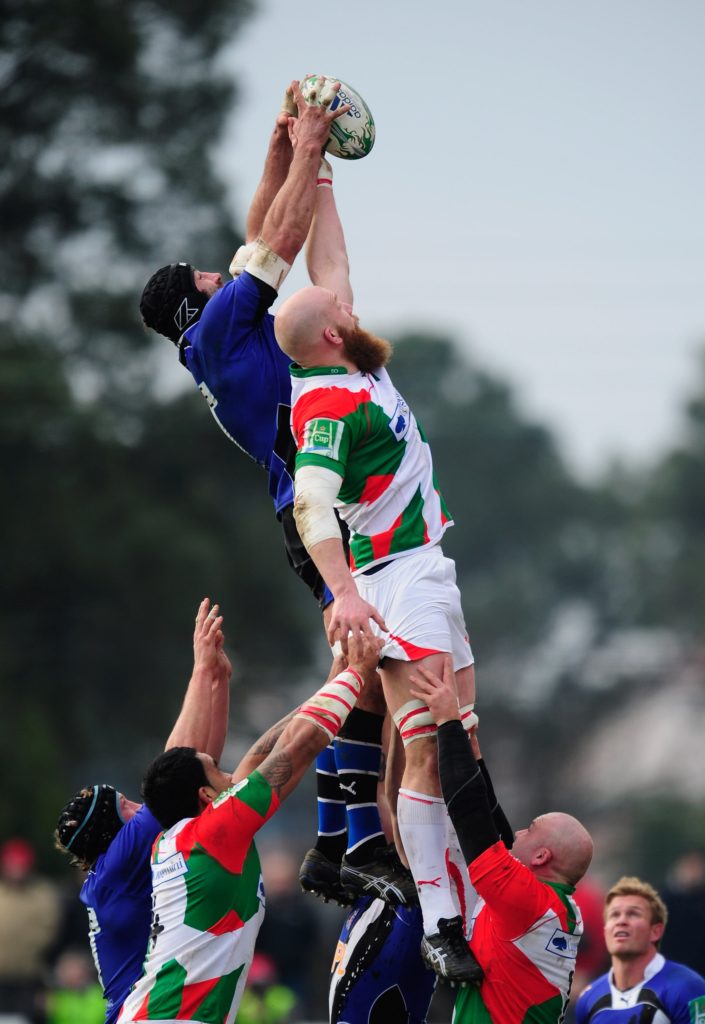
“I liked playing against guys where you had to raise your game, otherwise you’d be made to look an idiot,” he said. “Bakkies Botha was one and Danny Grewcock was a similar guy in that if you don’t front up, you’re going to look like a fool. Simon Shaw, similar kind of idea, a bit less on the front-up side but if you don’t play well, he’ll show you up.”
The other top moment in Lund’s rugby life was being called up by the Barbarians in 2011. “They could invite anyone and they invited me,” said Lund. “It was a ridiculously talented team, people like Joe van Niekerk, George Smith, Sergio Parisse. It was like a dream team and I was playing in it.
“We beat both England and Wales that year and it’s important for the Baa-Baas to be competitive.” Lund stood out for the Baa-Baas – no great surprise as a bearded giant – which raises another point for those under-the-radar players still hoping to get noticed.
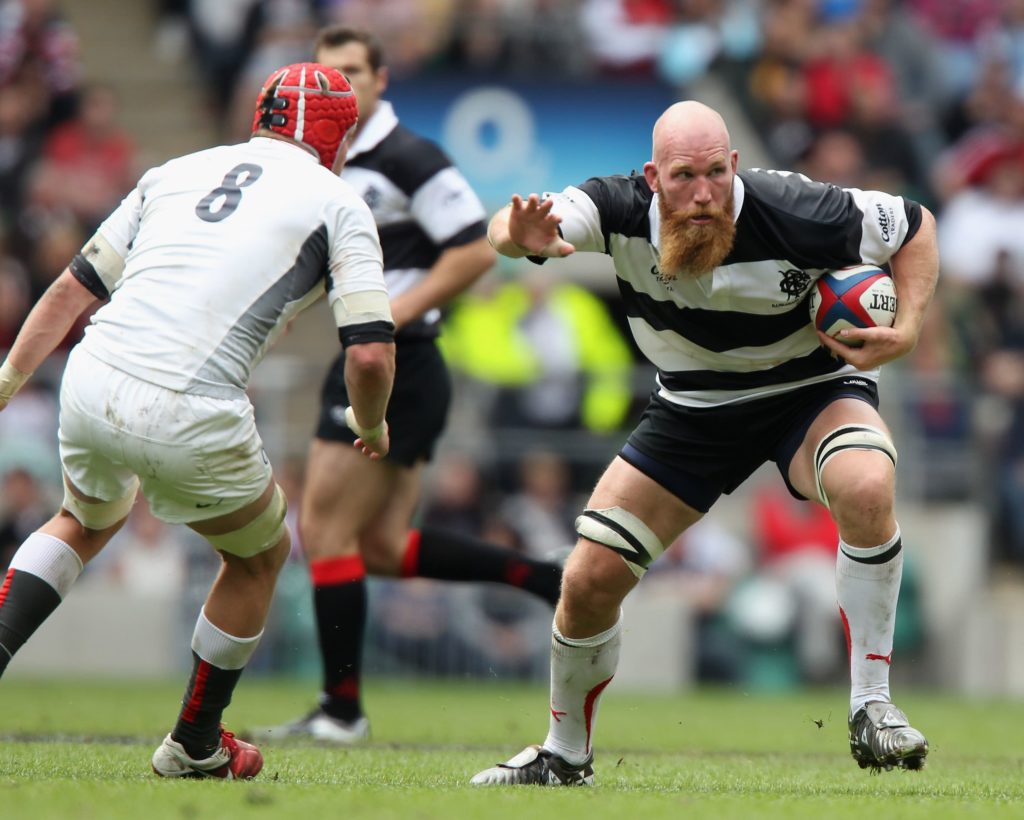
“I was chatting the other day with my uncle, who is a sports psychologist,” said Lund, who still lives and works in Biarritz with his wife and two daughters. “And he said you always need a ‘differentiator’. If you have two guys playing in roughly the same position in the same game, but one of them looks nondescript and the other has a pink scrum cap on, at the end of the game people will go, ‘The one in the pink scrum cap had a great game. I saw him, he was everywhere’. That’s not why I grew the beard but it explains some of the reaction.
“I started to grow the beard as a bit of a joke when I was in Leeds – one of the other blokes was growing one and it wasn’t particularly pretty, so I let mine grow too. It coincided with us winning two or three games on the bounce, so I was like, ‘Well I can’t shave it now’. I went to Biarritz and the fans picked up on it and it has been with me ever since. I’m too scared to get rid of it now in case everything goes downhill.
“People asking to take pictures with you is a cool thing in itself. It feels a bit weird and it wasn’t always the best when you’d just left the changing room and just wanted to get back on the bus, but I never said no. When we were the ‘away’ team, the other club’s fans always wanted selfies with first Yachvili, then Harinordoquy, then ‘The Beard’. Even if I was on the bench and only played five minutes at the end, they always wanted a picture.
“It’s four years since I played and I still get photo requests – but it’s always positive, it’s never been negative. Apart from in Bayonne. I don’t go to Bayonne. I avoid Bayonne because them and Biarritz are like Everton-Liverpool, Man City-Man Utd, they’re only 6km apart and it’s a proper derby. I still get whistled at and shouted at there but it’s funny.”
Those Bayonne fans should count themselves lucky they didn’t end up being used as a human battering-ram to get Erik to the front of the pizza queue. ‘Pepperoni and cheese. Yeah, yeah’.
More stories
If you’ve enjoyed this article, please share it with friends or on social media. We rely solely on new subscribers to fund high-quality journalism and appreciate you sharing this so we can continue to grow, produce more quality content and support our writers.



Comments
Join free and tell us what you really think!
Sign up for free